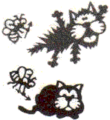Buzzbee: Difference between revisions
No edit summary |
m (Text replacement - "|related" to "|comparable") |
||
| Line 5: | Line 5: | ||
|derived_species=[[Beespy]]<br>[[Super Bee]] | |derived_species=[[Beespy]]<br>[[Super Bee]] | ||
|relatives=[[Butterfly (Donkey Kong 3)|Butterfly (''Donkey Kong 3'')]] | |relatives=[[Butterfly (Donkey Kong 3)|Butterfly (''Donkey Kong 3'')]] | ||
| | |comparable=[[Bunbun]] | ||
}} | }} | ||
'''Buzzbees'''<ref>''Donkey Kong 3'' [[media:Dk3flyerback.png|back flyer]] (English).</ref><ref>''Donkey Kong 3'' NES instruction booklet, page 6.</ref> (or '''Buzz bees'''<ref>''Donkey Kong 3'' NES instruction booklet, page 2.</ref>), also referred to as simply '''bees'''<ref>MICRO VS. SYSTEM ''DONKEY KONG 3'' instruction, page 8.</ref>, are insect-like enemies that appear in ''[[Donkey Kong 3]]''. They are the primary units of the [[beehive]]s in [[Stanley]]'s greenhouse. They attack by either throwing darts or swooping down from their hives, trying to steal Stanley's [[flower (Donkey Kong 3)|flower]]s. In the original arcade version, succeeding in this turns them into a [[Super Bee]]. One or two will sometimes escort [[Beespy|Beespies]], also referred to as '''Guards'''<ref>''Donkey Kong 3'' NES instruction booklet, page 7.</ref>. After round 12 (9 in the [[Nintendo Entertainment System|NES]] version), their appearance is altered. | '''Buzzbees'''<ref>''Donkey Kong 3'' [[media:Dk3flyerback.png|back flyer]] (English).</ref><ref>''Donkey Kong 3'' NES instruction booklet, page 6.</ref> (or '''Buzz bees'''<ref>''Donkey Kong 3'' NES instruction booklet, page 2.</ref>), also referred to as simply '''bees'''<ref>MICRO VS. SYSTEM ''DONKEY KONG 3'' instruction, page 8.</ref>, are insect-like enemies that appear in ''[[Donkey Kong 3]]''. They are the primary units of the [[beehive]]s in [[Stanley]]'s greenhouse. They attack by either throwing darts or swooping down from their hives, trying to steal Stanley's [[flower (Donkey Kong 3)|flower]]s. In the original arcade version, succeeding in this turns them into a [[Super Bee]]. One or two will sometimes escort [[Beespy|Beespies]], also referred to as '''Guards'''<ref>''Donkey Kong 3'' NES instruction booklet, page 7.</ref>. After round 12 (9 in the [[Nintendo Entertainment System|NES]] version), their appearance is altered. | ||
Revision as of 23:38, February 10, 2022
Template:Species-infobox Buzzbees[1][2] (or Buzz bees[3]), also referred to as simply bees[4], are insect-like enemies that appear in Donkey Kong 3. They are the primary units of the beehives in Stanley's greenhouse. They attack by either throwing darts or swooping down from their hives, trying to steal Stanley's flowers. In the original arcade version, succeeding in this turns them into a Super Bee. One or two will sometimes escort Beespies, also referred to as Guards[5]. After round 12 (9 in the NES version), their appearance is altered.
While unnamed, a Buzzbee first appears in Green House for Game & Watch, poking a cat as the game's alarm.
In Donkey Kong 3: Dai Gyakushū, Buzzbees transform into Super Bees when they are sprayed once. Being sprayed a second time defeats them. The design of Buzzbee itself is based on earlier rounds from the arcade game.
Buzzbees reappear in the Donkey Kong 3 Game & Watch, where they are simply called "bees." Stanley and Donkey Kong use their sprayers to force the bees to sting each other. One version of the North American boxart gives them a less fuzzy appearance.
Gallery
Names in other languages
| Language | Name | Meaning |
|---|---|---|
| Japanese | 兵隊バチ・バズビー[6] Heitaibachi Bazubī こバチ バズビー[7] Kobachi Bazubī |
Soldier-Bee Buzzbee Child-Bee Buzzbee |
References
- ^ Donkey Kong 3 back flyer (English).
- ^ Donkey Kong 3 NES instruction booklet, page 6.
- ^ Donkey Kong 3 NES instruction booklet, page 2.
- ^ MICRO VS. SYSTEM DONKEY KONG 3 instruction, page 8.
- ^ Donkey Kong 3 NES instruction booklet, page 7.
- ^ Donkey Kong 3 back flyer (Japanese).
- ^ Donkey Kong 3 Famicom instruction booklet, page 4.
| Donkey Kong 3 | ||
|---|---|---|
| Characters | Donkey Kong • Stanley | |
| Enemies | Buzzbee • Creepy • Super Bee* • Vine Eater* • Beespy • Attacker • Kabutomushi • Butterfly | |
| Greenhouses | Blue • Gray • Yellow | |
| Other | Gallery • Staff | |




